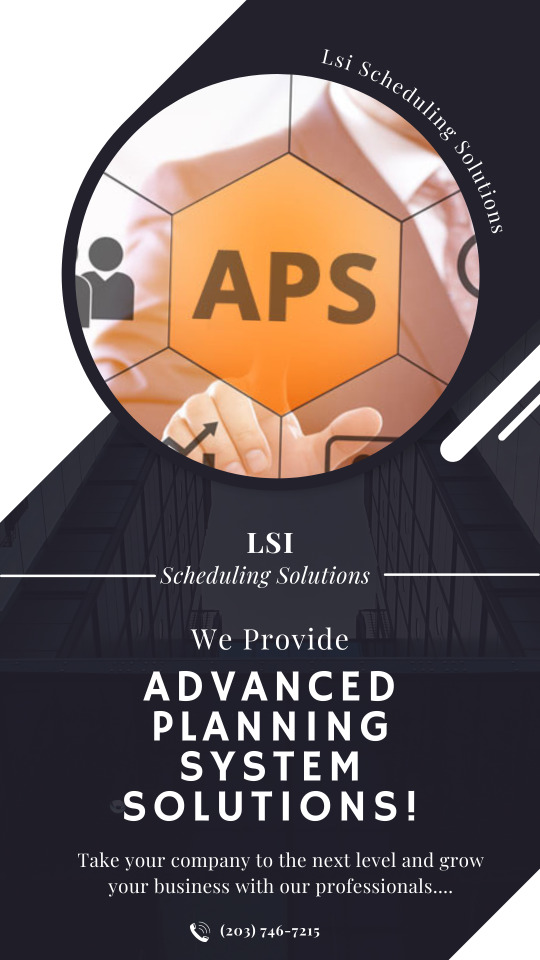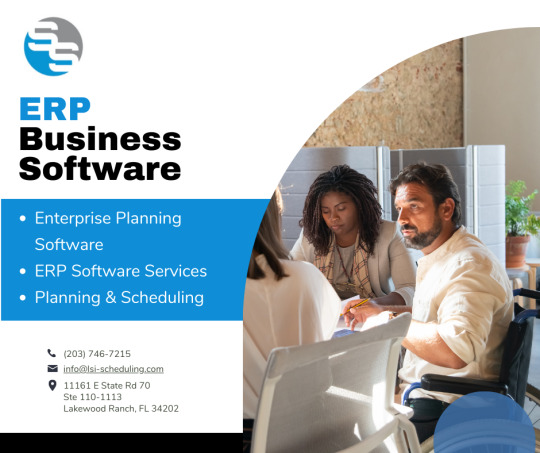Text
youtube
Everything we do is built around our ability to understand your unique requirements. In many cases our detailed knowledge of many industries, makes this easier.
#enterprise planning system#advanced planning and scheduling software#supply chain management#supply chain solutions#erp business software#advanced planning system#advanced production scheduling#supply chain#best advanced planning and scheduling software#Youtube
0 notes
Text

Supply Chain Business Solution - LSI Scheduling Supply chain business solutions refer to a range of technologies, strategies, and practices designed to optimize various aspects of the supply chain. These solutions aim to improve efficiency, visibility, and coordination in the flow of goods, services, and information from suppliers to customers.
#enterprise planning system#advanced production scheduling#advanced planning and scheduling software#supply chain management#supply chain solutions#advanced planning system#erp business software#supply chain#best advanced planning and scheduling software
0 notes
Text
Supply Chain Planning & Scheduling
Supply chain planning and scheduling are critical components of effective supply chain management. They involve processes that aim to optimize the flow of goods, information, and services from the point of origin to the point of consumption. Here's a brief overview of both:
Supply Chain Planning: Supply chain planning involves developing strategies and plans to ensure the efficient movement of goods and services through the supply chain. It aims to strike a balance between customer demand, inventory levels, and production capacity. Key aspects of supply chain planning include:
Demand Planning: Forecasting customer demand to ensure that the right quantity of products is available at the right time.
Inventory Planning: Determining the appropriate inventory levels to meet customer demand while minimizing holding costs and stockouts.
Production Planning: Scheduling production activities to meet demand while considering constraints such as equipment capacity and labor availability.
Distribution Planning: Optimizing the distribution network to ensure products reach their destination efficiently.
Sales and Operations Planning (S&OP): Aligning sales forecasts, production plans, and inventory levels to synchronize the entire supply chain.
Supply Chain Scheduling: Supply chain scheduling involves creating detailed timetables and plans for the movement of goods and services within the supply chain. It focuses on specific activities such as production, transportation, and order fulfillment. Key aspects of supply chain scheduling include:
Production Scheduling: Creating a detailed schedule for the production process, considering factors like machine availability, labor resources, and material availability.
Transportation Scheduling: Scheduling the movement of goods from suppliers to manufacturers and from manufacturers to distributors or retailers. This includes selecting appropriate transportation modes and routes.
Order Fulfillment Scheduling: Planning and managing the fulfillment of customer orders, from order receipt to delivery.
Resource Scheduling: Optimizing the utilization of resources across the supply chain, including warehouse space, transportation vehicles, and labor.
Both supply chain planning and scheduling are essential for ensuring that products are available when and where they are needed, minimizing inventory costs, and meeting customer demand efficiently. With the help of advanced technologies and data analytics, companies can improve their supply chain planning and scheduling processes to enhance overall performance and customer satisfaction.
#Supply chain solutions#supply chain planning#supply chain scheduling#supply chain company#enterprise planning system#advanced production scheduling#advanced planning and scheduling software#supply chain management#advanced planning system#erp business software#supply chain#best advanced planning and scheduling software
0 notes
Text
youtube
ERP Business Solutions
Implementing an ERP business solution requires careful planning, customization to meet specific business requirements, and proper training of employees to ensure successful adoption. ERP systems are particularly valuable for medium and large-sized enterprises with complex business processes and the need to manage vast amounts of data efficiently.
#ERP Planner#ERP production planning & Scheduling#ERP system software#enterprise planning system#advanced planning and scheduling software#Advanced Planning and Scheduling Platform#enterprise planning software#advanced production scheduling#planning and scheduling#capacity planner#planning & scheduling software#master scheduler#production planning system#aps software#production scheduling software#block scheduling#lean scheduling#manufacturing planning Florida#Youtube
0 notes
Text

Advanced Planning Solutions - Lsi Scheduling Solutions
Advanced planning solutions refer to sophisticated and intelligent systems, software, or methodologies designed to optimize and streamline planning processes in various domains. These solutions use advanced algorithms, data analytics, and artificial intelligence to make informed decisions and achieve better outcomes.
#advanced planning#advanced planning solutions#advanced scheduling#advanced planning & scheduling software#enterprise planning system#advanced production scheduling#advanced planning and scheduling software#supply chain management#supply chain solutions#erp business software#best advanced planning and scheduling software#advanced planning system#supply chain
0 notes
Text
What are the 5 components of ERP?
The five components of an ERP (Enterprise Resource Planning) system are:

Hardware: The hardware component refers to the physical equipment required to host and run the ERP software. This includes servers, data storage devices, networking equipment, and client devices (such as computers, laptops, or mobile devices) used to access the ERP system.
Software: The software component is the heart of the ERP system. It consists of the integrated suite of applications that cover various business processes, such as finance, human resources, inventory, sales, procurement, and manufacturing. The ERP software is responsible for centralizing data and automating processes across different departments within the organization.
Data: Data is a critical component of an ERP system. The ERP software stores and manages all relevant business data in a centralized database. This includes information about customers, suppliers, products, employees, financial transactions, and other essential business data. The data is the backbone of the ERP system and enables real-time access to information across the organization.
Procedures: The procedures component encompasses the business processes and workflows that are defined and standardized within the ERP system. These procedures govern how various tasks and activities should be performed within the organization, ensuring consistency and efficiency in operations. Implementing ERP often involves reengineering existing processes to align with best practices and optimize efficiency.
People: People are an essential component of any ERP system. This refers to the users of the ERP software, including employees, managers, and other stakeholders within the organization. Adequate training and user adoption are crucial to the successful implementation and utilization of the ERP system. Effective user involvement and engagement play a vital role in leveraging the full potential of an ERP solution.
By integrating these five components, ERP systems enable organizations to achieve seamless data flow, improved communication, and streamlined processes across various departments. The goal is to enhance overall operational efficiency, make data-driven decisions, and achieve business objectives more effectively.
0 notes
Text
#supply chain management#supply chain solutions#advanced planning system#enterprise planning system#advanced production scheduling#advanced planning and scheduling software#supply chain#erp business software
0 notes
Text
youtube
Supply Chain Management Solutions
Supply chain management is a crucial aspect of small businesses, as it directly impacts their operational efficiency, cost-effectiveness, and customer satisfaction. Even though small businesses may not have the same resources and complexities as larger enterprises, effective supply chain management can still significantly contribute to their success. By implementing effective supply chain management practices, small businesses can enhance their competitiveness, improve customer satisfaction, and achieve greater operational efficiency. Leveraging technology and adopting best practices can help small businesses optimize their supply chains, ensuring sustainable growth and success in a dynamic business landscape. LSI Scheduling Solutions offers custom supply chain management solutions for business to run it efficiently. Don't forget to call the experts.
#ERP Planner#ERP production planning & Scheduling#ERP system software#enterprise planning system#advanced planning and scheduling software#Advanced Planning and Scheduling Platform#enterprise planning software#advanced production scheduling#planning and scheduling#capacity planner#planning & scheduling software#master scheduler#production planning system#aps software#production scheduling software#block scheduling#lean scheduling#manufacturing planning Florida#Youtube
0 notes
Text
APS stands for Advanced Planning and Scheduling. It refers to a set of computer-based tools and techniques used in manufacturing, production, and supply chain management to optimize planning, scheduling, and allocation of resources. APS systems are designed to handle complex production environments and help organizations improve efficiency, reduce costs, and enhance overall operational performance.
Advanced Planning and Scheduling systems typically incorporate advanced algorithms and mathematical models to analyze various factors such as production capacity, resource availability, material constraints, order priorities, and customer demand. These systems take into account multiple variables and constraints to generate optimal production plans and schedules.
#enterprise planning system#supply chain management#advanced production scheduling#supply chain solutions#advanced planning and scheduling software#advanced planning system#best advanced planning and scheduling software#erp business software
0 notes
Text

ERP Business Software Solutions
Enterprise Resource Planning (ERP) business software solutions are comprehensive and integrated systems designed to streamline and manage various business processes within an organization. ERP software brings together different departments and functions, such as finance, human resources, inventory management, sales, and customer relationship management, into a single unified platform.
Implementing an ERP business software solution requires careful planning and consideration of the organization's needs. It's essential to choose the right ERP system and ensure effective training and support for its successful adoption and utilization.
LSI Scheduling Solutions, one of the best ERP business software provider in North America. If you're looking for best ERP business software for your business, then don't forget to get our experts.
#ERP Planner#ERP production planning & Scheduling#ERP system software#enterprise planning system#advanced planning and scheduling software#Advanced Planning and Scheduling Platform#enterprise planning software#advanced production scheduling#planning and scheduling#capacity planner#planning & scheduling software#master scheduler#production planning system#aps software#production scheduling software#block scheduling#lean scheduling#manufacturing planning Florida
0 notes
Text
Advanced Planning and Scheduling in Supply Chain Management
Advanced Planning and Scheduling (APS) plays a crucial role in optimizing supply chain management by providing intelligent and data-driven solutions to efficiently plan, schedule, and manage the flow of goods and services from suppliers to end customers.

Here's how APS contributes to supply chain management:
Demand Forecasting and Inventory Optimization: APS software uses historical data, market trends, and demand forecasts to predict future demand. By optimizing inventory levels, it ensures that the right quantity of products is available at the right time, reducing stockouts and excess inventory costs.
Production Planning and Scheduling: APS optimizes production schedules by considering production capacities, lead times, and resource availability. It helps manufacturers efficiently produce goods based on demand forecasts and reduces the time it takes to convert raw materials into finished products.
Supplier Collaboration: APS facilitates collaboration between suppliers and manufacturers by providing visibility into demand forecasts and production schedules. Suppliers can plan their production and deliveries accordingly, ensuring a smoother supply chain flow.
Distribution and Logistics Optimization: APS software optimizes transportation routes, mode selection, and distribution networks to minimize transportation costs and delivery lead times. It ensures that goods are delivered to the right locations at the right time.
Real-Time Visibility: APS provides real-time visibility into inventory levels, production statuses, and order fulfillment, enabling quick responses to changes or disruptions in the supply chain.
Constraint Management: APS considers various constraints, such as production capacities, resource availability, and shipping constraints, to avoid bottlenecks and ensure a balanced supply chain flow.
What-If Analysis: Supply chain managers can perform "what-if" scenarios to evaluate the impact of different variables, such as demand fluctuations or disruptions, on the supply chain. This helps in making informed decisions and contingency planning.
Customer Service and Order Fulfillment: APS software helps ensure on-time deliveries and accurate order fulfillment, enhancing customer satisfaction and loyalty.
Cost Optimization: By optimizing inventory, production, and transportation, APS reduces overall supply chain costs, leading to improved profitability.
Adaptability and Resilience: APS enables supply chain managers to adapt quickly to changing market conditions, customer demands, or disruptions, making the supply chain more resilient.
Overall, APS in supply chain management streamlines operations, reduces lead times, optimizes resource utilization, and improves overall supply chain efficiency. It enhances collaboration among different stakeholders, enables better decision-making, and helps businesses gain a competitive advantage in today's dynamic and fast-paced business environment.
#advanced production scheduling#supply chain management#enterprise planning system#supply chain solutions#advanced planning and scheduling software#advanced planning system#supply chain#best advanced planning and scheduling software#erp business software#SCM Software#APS Scheduling systems#APS Scheduling Software#APS Production#APS System
0 notes
Text
youtube
QAD ERP Software Services - LSI Scheduling Solutions
QAD is a global provider of enterprise resource planning (ERP) software solutions for manufacturing companies. In addition to its ERP software offerings, QAD also provides a range of services and support to help businesses implement, optimize, and maintain their ERP systems. LSI Scheduling Solutions is one of the best QAD ERP Software service provider in North America. If you're looking for best QAD ERP for your business performance, then don't forget to contact our experts.
#QAD Adaptive Solutions#QAD ERP Software Services#QAD System#QAD System Solutions#QAD Business System#QAD Busienss Solutions#QAD ERP Business Service Provider#Youtube
1 note
·
View note
Text

Supply Chain Solutions Provider in North America
Supply chain solutions refer to a set of tools, technologies, and strategies that businesses employ to optimize their supply chain operations. These solutions aim to enhance efficiency, reduce costs, improve visibility, and drive overall supply chain performance.
LSI Scheduling Solutions is one of the leading supply chain solutions provider in North America to offer custom tools and SCM solutions to improve the overall performance of your business.
For further discussion, you can book a free call with experts at (203) 746-7215.
#supply chain solutions#supply chain company#supply chain business#supply chain inventory#supply chain services#supply chain service provider#supply chain management
0 notes
Text
Implementing Advanced Planning and Scheduling

Implementing Advanced Planning and Scheduling (APS) requires careful planning and execution. Here are some key steps to consider when implementing APS in your business:
Assess your needs: Start by evaluating your current planning and scheduling processes. Identify the pain points, inefficiencies, and areas for improvement. Determine the specific goals and objectives you want to achieve through APS implementation.
Define requirements: Based on your assessment, define the specific requirements for your APS system. Consider factors such as demand forecasting, production planning, scheduling, capacity planning, integration with existing systems, reporting and analytics, and scalability.
Research and select an APS system: Research different APS software providers and evaluate their offerings based on your requirements. Consider factors such as functionality, ease of use, scalability, vendor reputation, customer support, and cost. Engage with the vendors to understand their implementation process and gather all necessary information.
Plan for data integration: Assess the data sources that the APS system will need to integrate with, such as ERP, CRM, or MES systems. Determine the data formats, data quality requirements, and any necessary data transformations. Ensure that data integration is smooth and seamless to enable accurate planning and scheduling.
Prepare data for implementation: Cleanse and validate your data to ensure its accuracy and integrity. Address any data inconsistencies, duplicates, or errors. Prepare the data in a format that is compatible with the APS system's requirements. It may involve data mapping, data cleansing, and data transformation processes.
Configure and customize the APS system: Work closely with the APS vendor to configure the system according to your specific requirements. Customize the system to align with your business processes, workflows, and rules. Define parameters, constraints, and optimization rules to reflect your production environment accurately.
Test and validate: Conduct thorough testing of the APS system before going live. Test various scenarios, data inputs, and system functionalities to ensure the system operates as expected. Validate the accuracy and effectiveness of the generated plans and schedules against real-world scenarios.
Training and change management: Train your employees on how to use the APS system effectively. Provide comprehensive training to key users and stakeholders who will be involved in planning and scheduling processes. Communicate the benefits of APS implementation and address any concerns or resistance to change.
Gradual rollout: Consider a phased or gradual rollout of the APS system. Implement the system in stages, starting with a pilot project or a specific area of your business. Monitor the results and make adjustments as necessary before expanding the implementation to other areas.
Continuous improvement: After the initial implementation, continuously monitor and evaluate the performance of the APS system. Collect feedback from users, identify areas for improvement, and make necessary adjustments. Leverage the system's reporting and analytics capabilities to gain insights and optimize your planning and scheduling processes.
Collaboration and engagement: Foster collaboration and engagement among departments involved in planning and scheduling processes. Encourage cross-functional communication and alignment to maximize the benefits of APS implementation.
Ongoing support and maintenance: Maintain a strong relationship with the APS vendor for ongoing support and system updates. Stay up to date with new features and enhancements that can further improve your planning and scheduling processes.
Remember that APS implementation is a continuous journey, and ongoing monitoring, evaluation, and improvement are essential to maximize the benefits and adapt to changing business needs.
#best advanced planning and scheduling software#enterprise planning system#advanced production scheduling#supply chain management#advanced planning and scheduling software#advanced planning system#supply chain#supply chain solutions
0 notes
Text
Selecting the best ERP system for your company requires careful evaluation and consideration of various factors. Selecting an ERP system is a significant decision for your company, so invest time and resources in the evaluation process. It’s often helpful to involve key stakeholders, including IT professionals, department heads, and end-users, to ensure a comprehensive assessment of your business needs and alignment with the chosen ERP system. LSI Scheduling Solutions is one of the well known and reputed ERP Solution provider Company in North America. If you're looking for effective ERP solutions then you're on the right place. Get a free consultation today!
#erp production scheduling#ERP Scheduling#ERP Scheduling System#ERP Scheduling Software#ERP Business Software#Enterprise Resource Planning#Enterprise planning software
0 notes
Text
youtube
Advanced Planning System - LSI Scheduling Solutions
An advanced planning system, also known as an Advanced Planning and Scheduling (APS) system, is a software solution that helps businesses optimize their production planning and scheduling processes. It uses advanced algorithms and data analysis techniques to generate optimal production plans that consider various factors such as capacity, materials, resources, and constraints. LSI Scheduling Solutions is a global provider of APS (Advanced Planning & Scheduling) and Shop Floor Data Collection solutions with resources in Florida, Connecticut, Nevada, South Carolina, Tennessee, Pennsylvania, and Slovenia. LSI Scheduling Solutions is uniquely positioned to bring you the finest APS technology with the most experienced APS implementation team in North America. Book a free consultation with experts for better understanding about APS.
#APS Scheduling systems#Production Planning & Scheduling#advanced planning system#advanced planning and scheduling software#Advanced Planning and Scheduling Platform#advanced production scheduling#best advanced planning and scheduling software#planning and scheduling#work order scheduling#manufacturing scheduling#manufacturing scheduling software#planning & scheduling software#Youtube
0 notes
Text
Absolutely! An advanced planning and scheduling software can indeed take your manufacturing business to the next level by optimizing your production processes, improving efficiency, and increasing overall productivity.
LSI Scheduling Solutions offers one of the best advanced planning scheduling software to deal with all business production and scheduling needs. Call now to get the benefits of it.
#best advanced planning and scheduling software#advanced production scheduling#advanced planning and scheduling software#advanced planning system#advanced planning and scheduling
0 notes